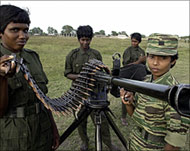Lanka Muslim party opposes president
Sri Lanka’s main Muslim party has withdrawn from a peace panel set up by President Kumaratunga and declared “all out war” against her for trying to splinter the community.

The Sri Lanka Muslim Congress (SLMC) said on Monday it was staying away from the first meeting of the National Advisory Council for Peace and Reconciliation, which Chandrika Kumaratunga launched last month.
SLMC leader Rauf Hakim said the president had engineered the defection of three of his legislators over the weekend in an effort to change the constitution. He said the move was prejudicial to minorities.
Three SLMC dissidents were sworn in by Kumaratunga at the weekend as non-cabinet ministers, boosting the strength of her coalition government in the 225-member assembly where it has a wafer thin margin.
“She wants to use our members and form a constituent assembly and resort to extra constitutional means to change the constitution and perpetuate herself in office,” Hakim said.
Muslim political influence
The Muslim leader said the government was seeking to change the proportional representation system to reduce the number of legislators from minority parties, and vowed to stage a campaign to resist the move.
“She is trying to destabilise the Muslims,” Hakim said. “We are taking her on. We are declaring all out war on her.”
|
“She is trying to destabilise the Muslims. We are taking her on. We are declaring all out war on her” Rauf Hakim, |
Muslims, who are the second largest minority after Tamils, form 7.5% of Sri Lanka’s 19 million population, but their block vote has considerable leverage as majority Sinhalese votes are split down the middle between two parties.
Tamils who account for 12.5% of the population also have a huge influence over national politics.
Hakim, a member of the previous government’s peace negotiating team with Tamil Tiger rebels, warned that the country could head for more instability and unrest if Kumaratunga pressed ahead with changing the statute.
The government announced last week that Kumaratunga would remain in office until December 2006, a year longer than expected since she was sworn in for a six-year term in December 1999.
Political crisis
Hakim said the political crisis in the country was due to Kumaratunga’s desire to continue after her current term ended.
The constitution allows a president a maximum of two six-year terms.
 |
|
Tamil rebels are fighting for |
Attempts to revive talks with Tiger rebels have failed and Kumaratunga has been struggling to boost her support in parliament after narrowly winning the April parliamentary elections.
The United National Party, which was in power during talks with the Tamil Tigers and today heads the opposition, has also stayed away from the panel. Tamil Tiger proxies boycott it too.
Any political settlement with the Tamil Tigers would require re-writing of the constitution, a move that needs the support of two-thirds of the legislature.